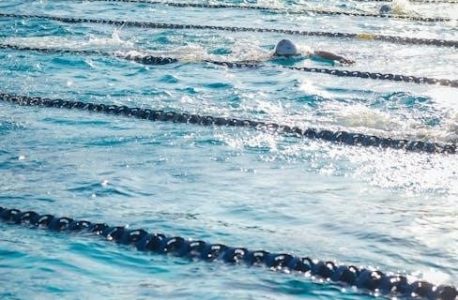A competitive swimmer’s diet plan must address high energy needs, hydration, and recovery. A tailored approach ensures optimal performance, focusing on balanced meals and avoiding digestive discomfort.
1.1 Importance of Nutrition for Swimming Performance
Nutrition plays a crucial role in optimizing swimming performance by providing the necessary fuel for energy, recovery, and muscle repair. A well-balanced diet ensures swimmers meet their high energy demands, delays fatigue, and enhances endurance. Proper fueling supports muscle function and recovery, while inadequate nutrition can lead to suboptimal performance and increased injury risk. A tailored diet plan addresses individual needs, helping swimmers achieve peak performance in training and competition.
1.2 Overview of Energy Requirements for Swimmers
Competitive swimmers have high energy demands due to intensive training and competition schedules. Their energy needs vary based on training intensity, duration, and weight. Swimmers require a substantial caloric intake to fuel workouts and support recovery, with carbohydrates, protein, and fats playing essential roles. Proper hydration is also critical for performance. A well-planned diet ensures swimmers meet these energy requirements, optimizing endurance, strength, and overall performance in the water.
1.3 Role of a Tailored Diet Plan
A tailored diet plan is essential for competitive swimmers, ensuring they meet their unique nutritional needs based on training intensity, competition schedules, and personal preferences. This plan helps optimize energy levels, supports muscle repair, and enhances recovery. By aligning nutrition with specific goals, swimmers can improve performance, avoid digestive discomfort, and maintain peak physical condition throughout their training and competition phases.
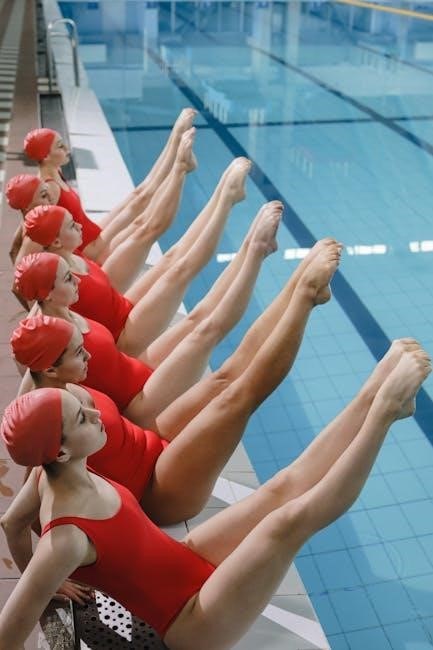
Foundational Principles of a Swimmer’s Diet
A swimmer’s diet should balance carbohydrates, protein, and fats, with high calorie intake to meet energy demands. Proper hydration and nutrient timing are also critical for performance.
2.1 Carbohydrates as the Primary Energy Source
Carbohydrates are the main fuel for swimmers, providing quick energy for intense workouts and endurance events. They are stored as glycogen in muscles and liver, which is depleted during swimming. Swimmers need 3-8g/kg/day of carbs, depending on training intensity. Focus on complex carbs like whole grains, fruits, and vegetables for sustained energy. Simple carbs, such as sports drinks, are ideal for quick replenishment during long sessions. Proper timing ensures glycogen stores are maximized, preventing fatigue and improving performance. Balanced carb intake is essential for optimal swimming efficiency and recovery.
2.2 Protein for Muscle Repair and Growth
Protein is essential for muscle repair and growth, particularly after intense swimming sessions. Swimmers require 1.2-2.2g/kg/day of protein to rebuild and strengthen muscle fibers. Lean sources like chicken, fish, eggs, and legumes are ideal. Timing protein intake, such as post-workout shakes or meals, enhances recovery. Adequate protein intake supports muscle synthesis, preventing injury and improving performance. It also aids in maintaining muscle mass during calorie-restricted periods, ensuring swimmers stay in optimal shape for competitions. Balancing protein with carbs and fats is crucial for overall athletic development.
2.3 Fats for Sustained Energy and Hormone Production
Fats are vital for sustained energy and hormone production in swimmers. They provide essential fatty acids and support cellular function. Healthy fats like avocados, nuts, and olive oil aid in absorbing vitamins. Fats also regulate hormones, including testosterone and estrogen, which are crucial for muscle function and recovery. While carbohydrates are the primary energy source, fats offer long-lasting fuel during endurance events. Balancing fat intake ensures swimmers maintain energy reserves and support overall physiological health, which is critical for peak performance in the water.
2.4 Hydration Strategies for Optimal Performance
Proper hydration is crucial for swimmers to maintain performance and prevent fatigue. Aim to drink water regularly throughout the day, with increased intake before, during, and after training. Monitor urine color to ensure it’s pale yellow, indicating adequate hydration. Avoid sugary drinks and opt for water or electrolyte-rich beverages during long sessions. Staying hydrated supports energy levels, muscle function, and recovery, ensuring swimmers can perform at their best. Dehydration can lead to decreased endurance and focus, so prioritizing hydration is essential for competitive success.
Carbohydrate-Loading for Endurance Events
Carbohydrate-loading maximizes glycogen stores for endurance events, enhancing performance. Focus on high-carb foods like whole grains, fruits, and pasta 2-3 days pre-competition to ensure energy sustainability.
3.1 Benefits of Carbohydrate-Loading
Carbohydrate-loading maximizes glycogen stores, providing sustained energy for endurance events. It delays fatigue, enhances performance, and supports swimmers during prolonged races. Proper timing ensures optimal energy levels without digestive discomfort, making it a key strategy for competitors in long-distance events. This method is particularly beneficial for open water swimmers in races exceeding 10 km, as it maintains stamina and endurance throughout the competition.
3.2 How to Implement Carbohydrate-Loading
Carbohydrate-loading involves increasing carbohydrate intake 2-3 days before competition to maximize glycogen stores. Start with a moderate-carb diet, then gradually increase to 8-10g/kg/day. Focus on low-fiber, easily digestible foods like pasta, rice, and bread. Reduce fiber and fat intake to minimize digestive discomfort. Stay hydrated to support glycogen storage. Practice this strategy during training to ensure tolerance and effectiveness. Tailor the plan based on individual needs and event duration to optimize energy levels and performance.
3.3 Timing of Carbohydrate Intake
Carbohydrate intake should be timed strategically to optimize energy levels. Consume a high-carbohydrate meal 1-3 hours before competition, aiming for 200-400g of carbs. Hydrate adequately to support glycogen storage. For events later in the day, have a smaller carb-rich snack 30-60 minutes prior. Practice timing during training to ensure digestive comfort. Adjust based on individual tolerance and event duration to maintain steady energy throughout the race. Proper timing enhances performance and delays fatigue.
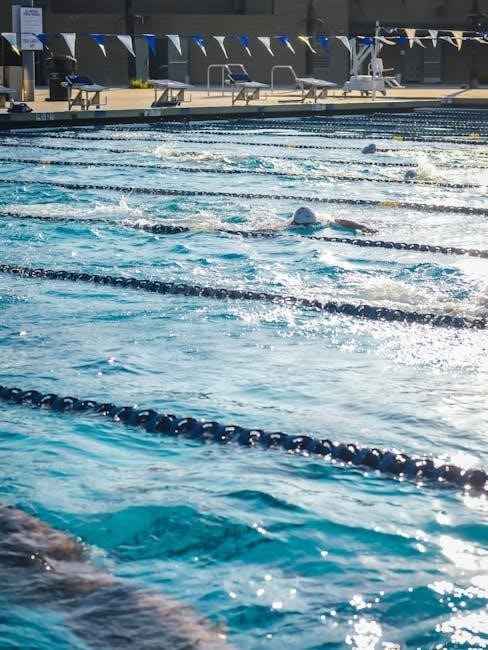
Pre-Competition Meal Planning
Plan meals 1-4 hours before competition, focusing on familiar, easily digestible foods like carbs and lean proteins. Avoid heavy or high-fiber foods to prevent discomfort.
4.1 Ideal Foods for Pre-Competition Meals
Opt for familiar, easily digestible foods rich in carbohydrates and lean proteins. Bananas, oatmeal, whole-grain toast, and lean meats like chicken or turkey are excellent choices. Avoid heavy, fatty, or high-fiber foods that may cause discomfort. Hydrate with water or sports drinks to maintain performance levels. Aim for a meal 2-4 hours before competition to ensure proper digestion and energy availability. Stick to foods that have been tested during training to minimize the risk of digestive issues during the event.
4.2 Timing of the Pre-Competition Meal
The pre-competition meal should be consumed 2-4 hours before the event to allow proper digestion. Lighter meals or snacks can be eaten 1-2 hours prior if racing later in the day. Practice the timing during training to ensure it suits individual digestive needs. Avoid eating too close to competition to prevent discomfort. Adjust the schedule based on the competition start time and personal preferences to optimize energy levels and performance in the water.
4.3 Avoiding Foods That May Cause Digestive Discomfort
Swimmers should avoid heavy, fatty, or high-fiber foods before competition to prevent digestive discomfort. Spicy, acidic, or gas-producing foods like beans and carbonated drinks can also cause issues. Opt for bland, easily digestible options such as toast, bananas, or plain rice. Avoid new or unfamiliar foods on competition day to minimize risks. Proper digestion ensures sustained energy and focus, allowing swimmers to perform at their best without distractions.
Sample Meal Plan for Competitive Swimmers
A structured meal plan ensures balanced nutrition. Breakfast: oatmeal with fruits. Lunch: grilled chicken with whole grains. Dinner: fish with vegetables. Snacks: nuts and yogurt for recovery.
5.1 Breakfast Options
Breakfast is crucial for competitive swimmers, providing energy for morning training. Opt for high-carb, protein-rich meals like oatmeal with fruit, eggs, or Greek yogurt with granola. Include complex carbs such as whole-grain toast or cereal for sustained energy. Fresh fruits add essential vitamins and antioxidants. Hydrate with water or a sports drink to replenish lost fluids. Avoid heavy or greasy foods that may cause discomfort during practice. A balanced breakfast supports endurance and recovery, ensuring peak performance in the water.
5.2 Lunch Ideas
Lunch for competitive swimmers should be nutrient-dense and easily digestible. Grilled chicken or turkey wraps with whole-grain tortillas, mixed vegetables, and lean proteins are ideal. Include complex carbs like quinoa, brown rice, or sweet potatoes for sustained energy. Add a side of fresh fruits or a salad for vitamins and antioxidants. Incorporate healthy fats like nuts or seeds for additional fuel. Hydrate with water or herbal tea. Avoid heavy or spicy foods to prevent digestive discomfort during afternoon training sessions. Ensure meals are balanced to support energy levels and recovery.
5.3 Dinner Recommendations
Dinner for competitive swimmers should focus on balanced nutrition to aid recovery and replenish energy stores. Grilled fish, lean meats like chicken or turkey, or plant-based proteins are excellent choices. Pair with complex carbohydrates such as brown rice, quinoa, or sweet potatoes for sustained energy. Include steamed vegetables like broccoli, spinach, or carrots for essential vitamins and minerals. Healthy fats like avocado or olive oil support hormone production and overall health. Avoid heavy, spicy, or high-fat foods to prevent digestive discomfort. Stay hydrated with water or herbal tea to prepare for the next day’s training.
5.4 Snacking Strategies
Snacking is crucial for competitive swimmers to maintain energy levels between meals. Opt for nutrient-dense snacks like fruits, nuts, or energy bars that are easy to digest. Greek yogurt with berries or a smoothie provides a quick energy boost. Avoid sugary or heavy snacks that may cause digestive discomfort. Timing is key—snacks should be consumed 1-2 hours before training or competition to allow proper digestion. Stay hydrated with water or sports drinks to complement snacks and ensure optimal performance in the water.
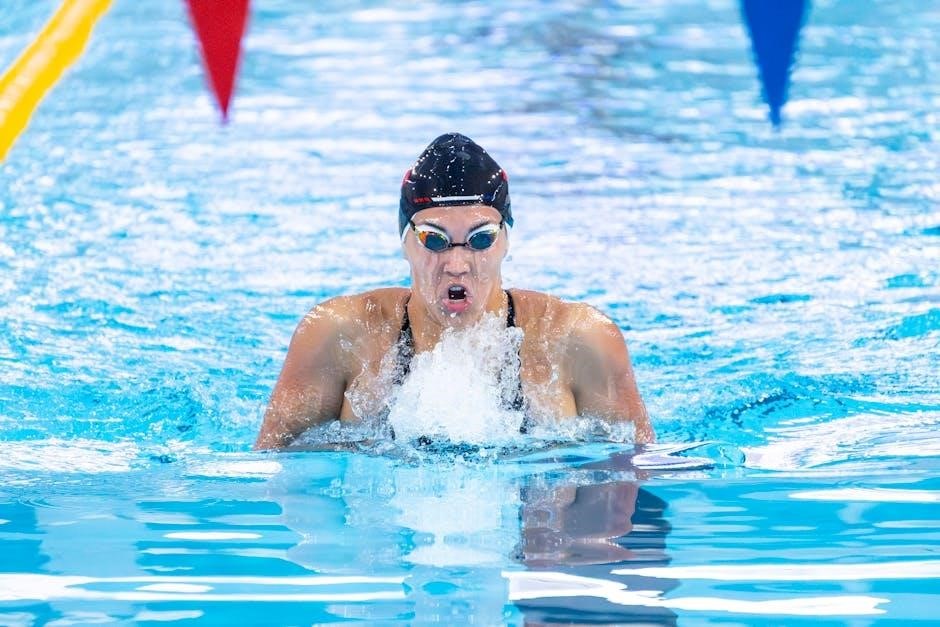
Post-Competition Recovery Nutrition
Post-competition recovery nutrition focuses on replenishing energy stores and rehydrating the body. Swimmers should consume a mix of carbohydrates and proteins within 30 minutes to aid muscle repair and recovery.
6.1 Refueling After Competition
Refueling after competition is crucial for recovery. Swimmers should consume a mix of carbohydrates and proteins within 30 minutes to replenish glycogen stores and repair muscles. Ideal options include bananas, recovery shakes, or energy bars. Hydration is also key, with water or sports drinks to restore fluid balance. This immediate post-competition nutrition helps reduce muscle soreness and supports the body’s recovery process, ensuring swimmers are prepared for future training and events. Proper refueling strategies can significantly enhance overall performance and recovery efficiency.
6.2 Rehydration Techniques
Rehydration is vital after competition to replenish lost fluids and electrolytes. Swimmers should drink water or sports drinks within 30 minutes of finishing. Aim for 16-20 ounces of fluid for every pound of water lost. Monitoring urine color can help gauge hydration levels—pale yellow indicates proper hydration. Incorporating water-rich foods like fruits and vegetables can also aid rehydration. Avoiding caffeine and alcohol, which dehydrate, is recommended. Proper rehydration techniques ensure swimmers recover efficiently and maintain optimal performance levels for future events.
6.3 Recovery Meals to Aid Muscle Repair
Post-competition recovery meals should focus on replenishing energy stores and repairing muscles. A balanced mix of high-quality protein, complex carbohydrates, and healthy fats is essential. Include lean proteins like chicken or fish, paired with whole grains, fruits, and vegetables. Antioxidants from berries and leafy greens help reduce muscle inflammation. Incorporate hydration-rich foods like watermelon or cucumbers to support rehydration. Meals should be consumed within 1-2 hours post-competition to maximize recovery. A well-structured recovery meal plan ensures swimmers return to peak performance quickly and effectively.
Special Dietary Considerations
Swimmers with dietary restrictions, such as vegetarian, vegan, gluten-free, or low-FODMAP, require tailored meal plans to ensure adequate nutrition. Avoiding triggering foods and focusing on nutrient-dense alternatives supports performance.
7.1 Vegetarian and Vegan Diets for Swimmers
Vegetarian and vegan swimmers can thrive with a well-planned diet rich in plant-based proteins like beans, lentils, and tofu. Iron from spinach and fortified cereals is essential for energy. Omega-3 sources like flaxseeds and walnuts support heart health. Vitamin B12 supplements may be necessary for vegans. Hydration and balanced meals, including whole grains and fruits, ensure sustained performance. Consulting a nutritionist helps tailor these diets to meet the swimmer’s specific needs, maintaining peak performance and recovery capabilities.
7.2 Gluten-Free and Low-FODMAP Diets
Gluten-free and low-FODMAP diets are essential for swimmers with specific intolerances or sensitivities. Gluten-free options like rice, quinoa, and corn ensure energy needs are met without digestive issues. Low-FODMAP foods, such as lactose-free milk and gluten-free bread, reduce bloating. Swimmers should avoid high-FODMAP foods like onions and beans. A gradual reintroduction of foods helps identify triggers; Consulting a nutritionist ensures these diets remain balanced and meet the swimmer’s energy demands, supporting performance and recovery while managing discomfort.
7.3 Managing Food Allergies and Intolerances
Swimmers with food allergies or intolerances must carefully manage their diets to avoid adverse reactions. Common allergens like nuts, shellfish, and dairy should be strictly avoided. Reading food labels and communicating with food providers are crucial. Carrying emergency snacks like energy bars or fruits ensures safety during competitions. A nutritionist can help tailor a diet plan that excludes problematic foods while maintaining nutritional balance. This approach prevents digestive issues, allowing swimmers to perform at their best without discomfort or health risks.
Travel and Competition Logistics
Plan meals and stay hydrated during travel, packing familiar foods to avoid digestive issues. Schedule eating around competition times to maintain energy levels and performance consistency.
8.1 Planning Meals for Travel
Planning meals for travel is crucial to maintain a competitive swimmer’s dietary consistency. Pack non-perishable, high-energy snacks like energy bars, nuts, and dried fruits. Ensure access to hydration with a reusable water bottle. Research dining options at the destination to identify suitable restaurants or meal services. Avoid heavy or unfamiliar foods that may cause digestive discomfort. Schedule meals around competition times to maintain energy levels and performance. Consider packing lightweight, nutrient-dense foods and plan for contingencies like delays. This ensures swimmers stay fueled and ready to compete at their best. Always prioritize familiar foods to avoid stomach issues during travel.
8.2 Staying Hydrated During Travel
Staying hydrated during travel is essential for competitive swimmers to maintain performance. Carry a reusable water bottle and drink regularly, especially during long trips. Avoid sugary drinks that can cause energy crashes. Monitor hydration levels by checking urine color; it should be pale yellow. Adjust water intake based on travel duration and climate. Pack electrolyte-rich beverages or tablets to replenish lost salts. Avoid alcohol and caffeine, which can dehydrate. Plan hydration schedules to ensure consistent fluid intake, preventing fatigue and ensuring peak performance during competitions.
8.3 Packing Essential Foods for Competition
Packing essential foods for competition ensures swimmers maintain energy levels and avoid digestive discomfort. Include familiar, easily digestible foods like energy bars, bananas, and nuts. Bring hydration-friendly items such as a reusable water bottle and electrolyte tablets. Avoid heavy or high-fiber foods that may cause stomach issues. Plan snacks and meals based on competition schedules, ensuring a balance of carbohydrates, proteins, and fats. Pack portable, non-perishable options to maintain fueling needs during travel and competition days, supporting peak performance and recovery.
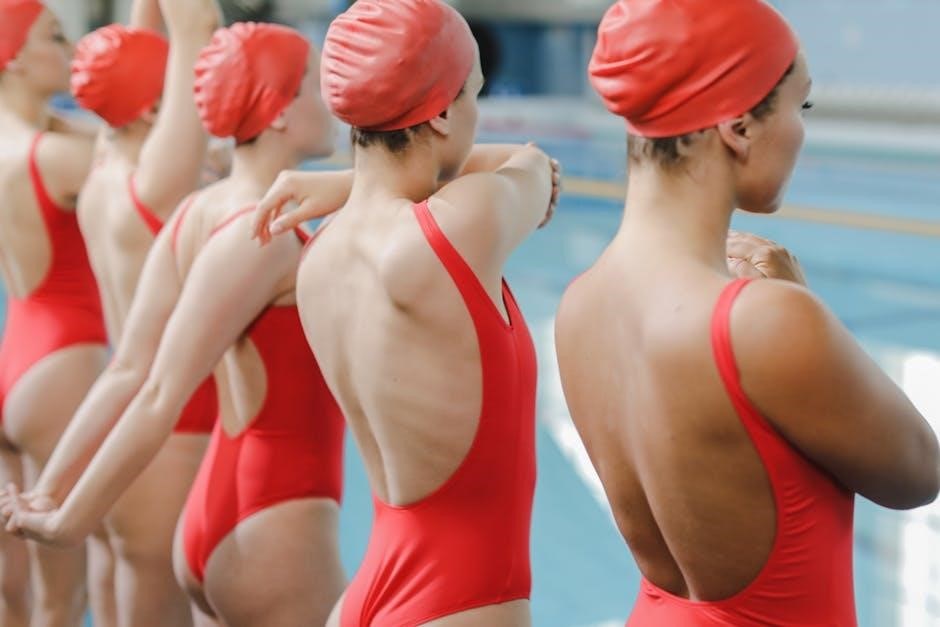
Periodization of the Swimmer’s Diet
A swimmer’s diet should be adjusted based on training phases, with higher carbohydrate intake during intense training and increased protein for recovery phases. Tailor nutrition to performance goals, ensuring optimal fueling for endurance and strength. Coaches and nutritionists play a key role in customizing these plans to meet individual needs and competition demands.
9.1 Adjusting Nutrition Based on Training Phases
Nutrition plans for competitive swimmers should align with specific training phases. During high-intensity periods, carbohydrate intake increases to fuel endurance, while protein is emphasized for muscle repair. In recovery phases, focus shifts to replenishing energy stores and supporting muscle growth. The diet must adapt to the swimmer’s workload, ensuring adequate calorie intake without causing digestive discomfort. Tailoring nutrition to training phases helps optimize performance and prevents fatigue. Coaches and nutritionists collaborate to fine-tune these adjustments, ensuring the swimmer’s dietary needs are met throughout the season.
9.2 Nutrition for High-Intensity Training
During high-intensity training, swimmers require a diet rich in carbohydrates to fuel energy demands and sustain endurance. Protein intake should be increased to support muscle repair and growth, while hydration is critical to maintain performance. Meals should be timed to avoid digestive discomfort, with a focus on familiar, easily digestible foods. Coaches and nutritionists often recommend carbohydrate-loading strategies and balanced meal plans to optimize energy levels. Proper nutrition during this phase ensures swimmers can push through intense workouts and recover effectively for upcoming competitions.
9.3 Nutrition for Recovery Phases
Post-workout nutrition is critical for swimmers during recovery phases. A balanced meal or snack, consumed within 30-60 minutes after training, helps replenish glycogen stores and repair muscles. Carbohydrates and protein should be prioritized in a 3:1 ratio to optimize recovery. Hydration is also essential, with electrolytes often needed to replace lost salts. While high-intensity training requires more fuel, recovery phases demand tailored nutrition to prevent fatigue and muscle soreness, ensuring swimmers are ready for their next session. Proper recovery nutrition supports long-term performance and overall health.
Monitoring and Adjusting the Diet Plan
Regularly track a swimmer’s performance and adjust their diet plan based on feedback from coaches and nutritionists to optimize energy levels and recovery, ensuring peak performance.
10.1 Tracking Progress and Performance
Monitoring a swimmer’s progress involves tracking energy levels, recovery, and performance metrics like race times and endurance. Adjustments to the diet plan are made based on feedback from coaches and nutritionists, ensuring optimal fueling strategies. Regular assessments help identify nutritional deficiencies or areas for improvement, allowing for personalized tweaks to enhance physical output and recovery efficiency. This iterative process ensures the diet plan remains aligned with training goals and competitive demands, fostering peak performance and overall athlete well-being. Consistent monitoring is key to sustaining success in competitive swimming.
10.2 Fine-Tuning the Diet Based on Feedback
Fine-tuning a swimmer’s diet involves making adjustments based on performance feedback, training phases, and physiological responses. Coaches and nutritionists collaborate to assess energy levels, recovery, and race results. Adjustments may include increasing carbohydrate intake for endurance events or boosting protein for muscle repair. Feedback also helps identify hydration and electrolyte needs, ensuring optimal performance. Regular reviews allow for personalized tweaks, such as modifying meal timing or food choices, to enhance overall athletic output and address any nutritional gaps. This iterative process ensures the diet remains aligned with evolving training demands and competitive goals.
10.3 Role of Coaches and Nutritionists
Coaches and nutritionists play a crucial role in optimizing a swimmer’s diet plan. They assess training demands, monitor progress, and provide personalized recommendations. Coaches ensure dietary strategies align with training phases, while nutritionists design meal plans tailored to energy needs and recovery. Together, they help swimmers avoid nutritional pitfalls, adjust for competition logistics, and maintain peak performance. Their expertise ensures the diet plan evolves with the swimmer’s goals, fostering a competitive edge and overall health. Regular communication between athlete, coach, and nutritionist is key to long-term success.

